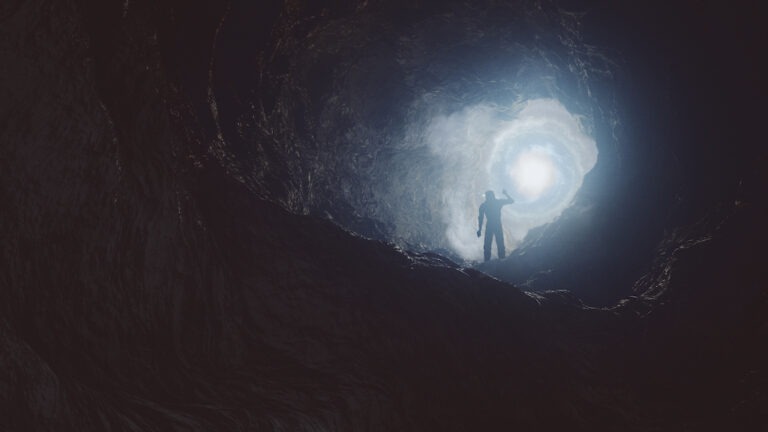Aubrey Marcus’ Darkness Retreat Produced Psychedelic Visions

Aubrey Marcus is widely known as being the founder of health and fitness brand Onnit, a company focused on what he calls “Total Human Optimization,” which develops dietary supplements, nootropics (natural compounds that enhance brain function), and exercise gear.
Concurrent with his company’s meteoric growth, Marcus has become one of the most popular voices in the alternative, new age space with his eponymous podcast, where he discusses topics ranging from mental health to plant medicine, sexuality, and cultural paradigm shifts.
Like most stories of success, Marcus struggled in his early adulthood to find true meaning in life. While discussing his legacy in a recent interview on Open Minds with Regina Meredith, Marcus said, “I was looking for my purpose. I always felt like I had something important to give.”
This sentiment began early in his life, inspired by movies depicting sagacious masters who encouraged their protegés by telling them they had something important to contribute to the world. But like the archetypal Hero’s Journey, his road to success was punctuated by obstacles he first had to overcome.
One of the ways Marcus gained clarity on his journey was by imbibing the powerfully psychedelic ayahuasca brew, which gave him insight into the nature of his mind and his role in the universe. Today, psychedelic modalities through breathwork, sensory deprivation, and plant medicines are topics regularly discussed on his podcast.
But it was through his initial experience with the DMT-containing ayahuasca that Marcus embraced not just an internal philosophical shift, but also one in his identity. Choosing to rebrand with his middle name “Aubrey,” he began to build Onnit, based on a conversation with Joe Rogan about what kind of supplement he would be interested in trying. When Rogan responded with a cognitive enhancer made from plants and natural substances, he began formulating Alpha Brain and subsequently formed a fortuitous partnership with the world’s most popular podcaster.
Marcus’s conclusions about life are highly influenced by his fascinating firsthand experiences that drive his philosophical curiosities. While potent psychedelics like ayahuasca are an almost guaranteed method of achieving ego death and confronting inner demons, Marcus’ desire to explore the deeper realms of human consciousness has taken him even further.
In 2020, he embarked on a retreat spent in complete darkness for an entire week. This sensory deprivation was undertaken with the intention of self-reflection as well as inducing a release of endogenous DMT to produce psychedelic visions. Though the first few days didn’t exactly produce powerful visions, Marcus says he did contemplate and pick apart every aspect of his life, convincing himself he needed to change everything, but these thoughts were fleeting. Then, after a few days, he says he eventually experienced some of the most intense visions, culminating in a discussion with the Buddha, himself.
Marcus says the insight from these experiences gave him new outlooks on life including an appreciation for his family and loved ones, in addition to learning how the machinations of the ego shape our daily thought patterns.
Marcus’s work is also about helping people discover the freedom to be themselves by recognizing who they are in all their complexity. He tells Meredith we are really a mixture of good and bad, courageous and fearful, and that we don’t have to pretend to be one or the other. It’s about being aware of the “shadow aspects” that we suppress instead of embracing who we are.
Marcus admits, “I know nothing. But every day I ask questions and take a seat at the table where Truth likes to have snacks.”
New Study Could Show Why Kids Are Creative Geniuses

Most young children show signs of creative genius, but over time those numbers drop significantly.
A new study on how young children learn could help parents teach their children and help answer the question of nature versus nurture. In 1968, a study conducted by George Land and Beth Jarman found that 98% of children were considered creative geniuses by NASA standards.
But as this group grew older, that number dropped off rapidly; at age 10, it fell to 30 percent, by age 15 it dropped to 12 percent, and by adulthood, it was just two percent. Today, researchers at Birkbeck University in London are using brainwave scanning caps to look inside the brains of kids while they complete various tasks.
Artie Wu, an expert on parenting, relationships, and finding your bliss, weighs in on the subject.
“Children come out, they see the world as it is —they don’t know — there’s no filter between brain and mouth,” Wu said. “But this is the genius view, they see the world as it is, not as it should be. The aperture has not tightened down, they just see everything as it is, and they say it. We typically need to do some bit of trimming, training, and educating for them to be able to get along in life. (But) the way we do the enforcement is through shaming.”






